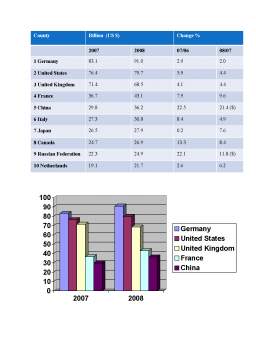Extras din referat
Tourism – a key to development, prosperity and well-being
Over time, an increasing number of destinations have opened up and invested in tourism development, turning modern tourism into a key driver for socio-economic progress, through the creation of jobs and enterprises, infrastructure development, and the export income earned.
Tourism has become one of the major international trade categories. The overall export income generated by international tourism including passengers transport reached US$ 1.1 trillion in 2008, or US$ 3 billion a day.
Tourism exports account for as much as 30% of the world’s exports of commercial services and 6% of overall exports of goods and services. Globally, as an export category, tourism ranks fourth after fuels, chemicals and automotive products. For many developing countries it is one of the main income sources and the number one export category, creating much needed employment and opportunities for development.
The most comprehensive way to measure the economic importance of both international and domestic tourism in national economies is through the Tourism Satellite Account (TSA) Recommended Methodological Framework, approved by the UN Statistics Commission. Though many countries are in the process of implementing the Framework, relatively few have full, comparable results available. As data is currently still fragmented, it is not feasible to provide precise and detailed worldwide results. However, the knowledge and experience gained through the TSA exercise has certainly contributed to a much better understanding of the role of tourism in economies worldwide and allows for a tentative approximation of key indicators. Based on the information from countries with data available, the worldwide contribution of tourism to gross domestic product (GDP) is estimated at some 5%. Tourism’s contribution to employment tends to be slightly higher and is estimated in the order of 6-7% of the overall number of jobs (direct and indirect). For advanced, diversified economies, the contribution of tourism to the GDP ranges from approximately 2% for countries where tourism is a comparatively small sector, to over 10% for countries where tourism is an important pillar of the economy.
For small islands and developing countries, or specific regional and local destinations where tourism is a key economic sector, the importance of tourism tends to be even higher.
2008 – International tourism challenged by deteriorating world economy
In 2008, international tourist arrivals reached 922 million, up from 904 million in 2007, representing a growth of 2%. This overall growth builds on the strong results of the first part of the year, before the collapse of the financial markets and the subsequent recession. The second half of the year showed an abrupt shift in trend, with international arrivals flat or showing negative growth in each of the last six months of 2008. Overall, the 5% growth between January and June gave way to a 1% decline in the
second half of the year. Though not immune to the economic woes, tourism has so far resisted the economic downturn better than other sectors, such as construction, real estate and car manufacturing.
All regions had positive growth except Europe, which suffered stagnation in arrivals (+0.3%). The best performance was seen in the Middle East, where international arrivals reached 55 million, a rise of 18% over the previous year.
Africa grew at half the rate of the previous year, but still registered an above-average growth of 4%. The Americas grew 3%, boosted by the strong performance of Central and South American destinations and the strength of traffic to the USA in the first half of the year. Asia and the Pacific saw a
significant slowdown in arrivals as compared to its previous bumper years, growing just over 1% in 2008. International tourism receipts rose by 1.7% in real terms in 2008 to US$ 944 billion (642 billion euros).
Receipts from international passenger transport are estimated at US$ 183 billion, bringing the total international tourism receipts including international passenger transport (i.e. visitor exports) to over US$ 1.1 trillion, corresponding to US$ 3 billion a day. This represents around 30% of the worldwide volume of service exports and 6% of overall exports of goods and services.
Arrivals evolution from 1990 to 2008, million person
Receipts evolution from 1990 to 2008
Growth in receipts mirrors that of arrivals
Visitor expenditure on accommodation, food and drink, local transport, entertainment, shopping, is an important pillar of the economies of many destinations, creating much needed employment and opportunities for development. More than 80 countries earned over US$ 1 billion from international tourism in 2008.
UNWTO estimates that worldwide receipts from international tourism reached US$ 944 billion (642 billion euros) in 2008. In absolute terms, international tourism receipts increased by US$ 87 billion, but only by 16 billion euros due to the depreciation of the US dollar against several world currencies and, in particular, the euro (in 2008 the US dollar lost 7% against the euro).
Preview document
Conținut arhivă zip
- Tourism - A Branch of World Economy.ppt
- Tourism - A Branch of World Economy.doc



















